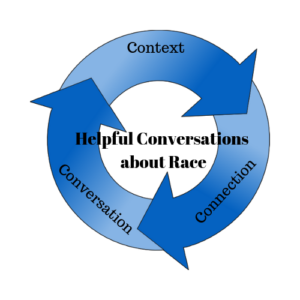March 8, 2021 in anti-racism
Why Anti-Racism?

By Janet Bischoff
SEPA Anti-Racism Team
We Americans like to think positively, to look on the bright side of things, build the future. In our optimistic efforts to forge ahead, could it be that we have forgotten, maybe even deliberately erased, large chunks of history from our collective memory? William Faulkner famously said that “The past is never dead. It’s not even past.” His trenchant words speak to our question of the day, “Why Anti-Racism?”
Our 400-year-old history of racism in America was preceded by racial ideas from the Doctrine of Discovery* and other European colonial practices which condoned slavery and exploitation. It’s a long story, indeed. Many of us grew up never hearing this story. History is written by the victors, as they say, and the American saga has been carefully tailored to support and justify this saga. As a result, we Americans haven’t been able to confront ourselves realistically as part of this story.
Are we responsible for what we do not know, what we have never been taught? What do we really know of the indigenous peoples who inhabited this continent before Europeans “discovered” it? What do we know of our racist treatment of Asians, Latinos, and everyone who seemed to be “other”? And indeed, how much do we really understand about the kidnapping, brutalization, sale, rape and centuries-long dehumanization of Africans as our young nation built a booming economy on their enslavement?
We seem to be waking up to our true history, as evidenced by the excellent educational opportunities offered by Black History Month this February. But, as some have said, Black History is our history, too, and shouldn’t be separated from the American narrative. Even though our 21st century selves did not live during the colonial era, we continue to be a part of this legacy, because its effects on our lives are deep within our culture, and still accord disproportionate power to white people. White people are the dominant culture, and as such, need to accept responsibility to right the wrongs of injustice. We Lutherans, as an overwhelmingly white denomination, need to be part of the solution.
Americans are beginning to confront our racist history in much the same way as we Christians admit our sinfulness before we can experience grace. We need to be anti-sin before we can be pro-grace. Especially in Lent, we remind ourselves that we must repent, turn around and rethink our position, before grace can find us.
Likewise, we need to educate ourselves in the persistence of racism in America, particularly in the re-emergence of white supremacy, before we can acknowledge it in ourselves, our culture, and our institutions. Only then can we start to stand up for justice, speak truth to power, and humbly begin to change ourselves. There’s no shortcut. That would be Bonhoeffer’s definition of “cheap grace,” where we don’t do the work, but want to jump ahead, blissfully unaware of the true cost of actively fighting for justice and equity. Dietrich Bonhoeffer showed up. He paid the price. That’s why we remember his words to this day. It’s what we actually do that matters.
So, as we pray our way through this Lenten journey, may we ask for the grace of repentance, seeking ways to become loving anti-racists by remembering the words of Micah 6:8 that call us to seek mercy, love justice, and walk humbly with our God. ◼︎
* Notable in the history of the Doctrine of Discovery are two papal bulls (1452 and 1493) which encouraged European “discoverers” to claim lands, and to dominate and enslave whole populations deemed pagan or unbelievers. See https://upstanderproject.org/firstlight/doctrine for more.
Janet Bischoff, a member of St. Paul’s, Glenside, is a member of the Anti-Racism Team. Janet can be heard addressing the Synod Assembly in 2017: https://www.youtube.com/watch?v=Xfp_Ajr8uTo&t=4s

